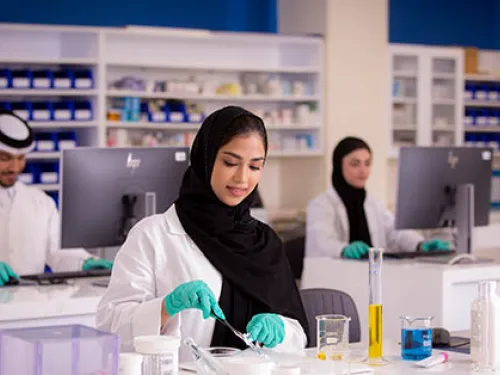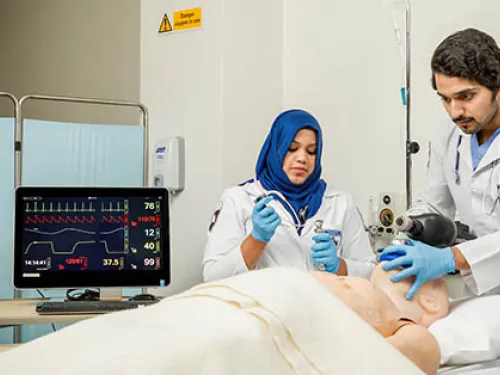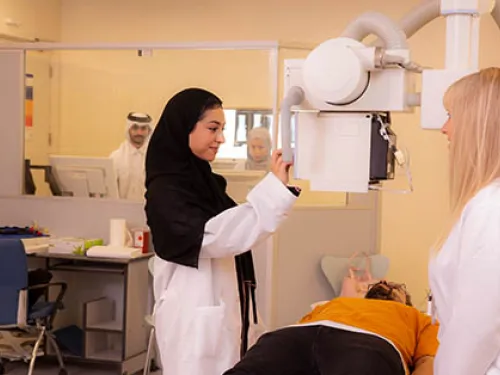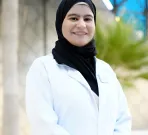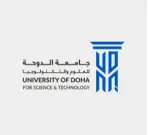The College of Health Sciences (CHS), University of Doha for Science and Technology (UDST) is recognized as Qatar’s premier institution for the development and delivery of world class Nursing and Allied Health programs. Guided by Qatar’s National Health Strategy 2018-2022 and Qatar’s National Vision 2030 to build a strong and thriving healthcare workforce, the College offers a broad scope of internationally aligned diploma, bachelor, and graduate health programs designed to support health professional licensing and credentialing requirements.
CHS Programs are founded on excellence and innovation in education, best-practice, research/scholarship, service, and industry engagement. Theoretically informed curricula are designed to meet evolving educational needs and innovative pedagogies for diverse learners. Our offering of a broad scope of health science programs lends to embedded interprofessional education. Classes and practical experiences are taught by highly skilled faculty and practitioners who bring current academic and clinical expertise from the real world. Close collaborations with our community and national and international industry partners ensure students gain context relevant educational and practical experiences. Our students, faculty, and external stakeholders engage in research and scholarship to improve person, healthcare, and health system outcomes.
Facts and Figures
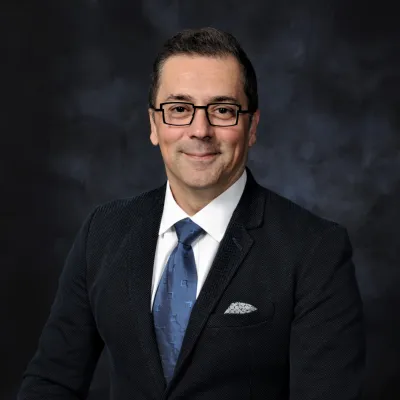
Welcome Message from the Dean
It is with great honor and enthusiasm that I extend my warmest greetings as the Dean of the College of Health Sciences at the University of Doha for Science and Technology (UDST).
Guided by the values of excellence, integrity, and inclusivity, the College of Health Sciences is a cornerstone of UDST’s mission to deliver applied education that meets the real-world needs of our society. Our commitment aligns deeply with the Qatar National Vision 2030, which prioritizes a world-class healthcare system, human capital development, and sustainable progress. In this context, our role extends beyond the classroom, we are shaping future-ready professionals who will be leaders, innovators, and compassionate caregivers.
I believe that innovation thrives when diverse voices come together with a shared purpose. Therefore, I am committed to fostering strong partnerships within the university, across health sectors in Qatar, and with international institutions that will elevate our impact and expand opportunities for students and faculty alike.
Together, we will continue to build a college that is responsive to the dynamic health challenges of our time, rooted in research and evidence-based practice, and driven by a vision of health and well-being for all. Our students are the heartbeat of this mission, and we will ensure they are empowered with the skills, knowledge, and ethical foundation to excel in a rapidly evolving global healthcare landscape.
I invite all stakeholders, students, faculty, industry partners, and community members to join us in this journey. Through collaboration, creativity, and a shared commitment to excellence, we will advance the future of health sciences education in Qatar and beyond.
Dr. Shahrokh Esfandiari
College of Health Sciences
Academic Programs Offered
State of Art Facilities
Upcoming Events
Testimonials
Our Team
The College of Health Sciences is a vibrant community of academic staff, students, and staff who are dedicated to health education and innovation for the future generation.
Talk to Our Academic Advisors
We are excited you are interested in joining UDST's College of Health Sciences!
You can request more information or contact below for general inquiries:
Become a Student
Take the next steps in getting your professional training at UDST


